Overview
Nursing in home health care plays a vital role in offering personalized medical assistance to patients in the comfort of their homes. This approach is especially beneficial for seniors and those managing chronic illnesses, as it significantly enhances their comfort and independence. By providing essential services such as medication management and health monitoring, we not only meet medical needs but also nurture emotional well-being. This holistic care ultimately enriches the quality of life for both patients and their families.
In addition, home health care addresses the emotional aspects of healing, fostering a supportive environment that encourages connection and understanding. As a result, families can feel reassured knowing that their loved ones are receiving compassionate care tailored to their unique needs. We’re here for you, ensuring that every patient feels valued and cared for in their journey toward better health.
Introduction
In our increasingly aging society, home health care nursing has become a crucial lifeline for individuals seeking medical assistance in the comfort of their own homes. This specialized field not only addresses the ongoing health needs of patients but also enhances their quality of life through personalized care. With home health care nurses—ranging from registered nurses to licensed practical nurses—performing vital tasks such as:
- Medication management
- Health monitoring
- Emotional support
Families can take comfort in knowing that their loved ones receive comprehensive care tailored to their unique situations.
As we witness a shift towards home-based services, understanding the roles, responsibilities, and benefits of home health care nursing is essential for families navigating this vital support system. We’re here for you, and your comfort is our priority. Together, we can ensure that your loved ones receive the compassionate care they deserve.
What is Home Health Care Nursing?
Nursing in home health care is an essential and specialized area where nurses provide medical assistance directly to patients in the comfort of their own residences. This approach is especially vital for individuals who need continuous medical attention but prefer the familiarity and comfort of their own surroundings. Nurses providing care at home, including registered nurses (RNs) and licensed practical nurses (LPNs), perform crucial duties such as administering medications, monitoring vital signs, and delivering wound care.
The importance of nursing in home health care cannot be overstated, particularly for seniors and individuals with chronic illnesses. This method not only enhances individual comfort but also promotes independence and improves overall quality of life. Did you know that from 2019 to 2023, 14.1% of residential care episodes in the U.S. led to hospital admissions? This statistic emphasizes the significance of efficient domestic assistance in managing medical conditions and preventing avoidable hospital admissions, showcasing the essential function that home nursing professionals perform in preserving individual wellness.
As trends shift towards residential and community-based support, influenced by policy changes and the preferences of older adults, there is a growing acknowledgment of the advantages of nursing in home health care. Many patients now prefer receiving treatment in their residences rather than in medical facilities, indicating a wider societal shift towards individualized assistance in comfortable environments. This transition is anticipated to create numerous job openings for personal support and assistance aides, aligning with the growing need for customized support solutions.
Best Care Nurses Registry is dedicated to delivering adaptable and empathetic services, ensuring that families receive individualized assistance that reduces stress and enhances safety for the elderly. Our caregivers are thoroughly evaluated and committed to excellence, ensuring continuity of support and strong caregiver-client connections. We enhance long-term support insurance advantages and offer various payment choices, positioning ourselves as a leader in the domestic assistance sector.
Furthermore, our services are cost-effective, providing families with a more affordable option to hospital treatment without compromising quality. In summary, residential nursing not only meets the medical requirements of individuals but also addresses their emotional and psychological well-being, making it an essential service for families aiming to offer the best possible support for their loved ones.
Call us today at (888) 203-2529 to discuss your needs and explore how we can assist you.
Roles and Responsibilities of Home Health Care Nurses
Nursing in home health care is essential, as home nursing professionals provide individualized assistance to individuals in their residences, ensuring that seniors obtain the compassionate support they require. Their responsibilities encompass a variety of essential tasks, including:
- Patient Assessment: Conducting thorough initial and ongoing assessments to monitor the patient’s health status is fundamental. This procedure enables nurses to recognize alterations in the individual’s state and modify support plans accordingly, ensuring that each person receives customized assistance.
- Care Planning: Working together with individuals and their families, nurses create personalized plans designed to address particular wellness requirements. This cooperative method guarantees that support is in harmony with the individual’s preferences and objectives, improving their quality of life and autonomy.
- Medication Management: Home nursing professionals are responsible for administering medications and educating patients about their treatment plans. This includes ensuring adherence to prescribed therapies and addressing any concerns regarding side effects or interactions, which is vital for maintaining health and preventing complications.
- Wound Care: Providing specialized care for wounds is another critical responsibility. Nurses perform dressing changes and monitor for signs of infection, ensuring that healing progresses effectively and safely.
- Health Monitoring: Regularly checking vital signs and documenting any changes is essential for maintaining individual safety. Nurses convey important discoveries to the healthcare team, enabling prompt actions when needed, which is essential for avoiding deterioration.
- Individual Education: Instructing individuals and their families on managing medical conditions and encouraging wellness is essential. This enables individuals to assume an active part in their treatment, improving their overall well-being and decreasing the likelihood of social isolation.
These roles are not only essential for ensuring thorough and efficient assistance but also highlight the distinctive obstacles encountered by nurses involved in nursing in home health care. For instance, they frequently operate autonomously, necessitating confidence and self-sufficiency in evaluation and clinical decision-making. The typical personal nursing professional oversees a workload of roughly 5 to 7 patients, balancing the requirements of each person’s treatment while handling administrative responsibilities and safety issues in residential environments.
Additionally, personal support aides, including CNAs and HHAs, may offer fundamental medical-related services under the supervision of a nurse, illustrating the cooperative aspect of assistance in residential settings.
As the environment of domestic wellness services transforms in 2025, the significance of these duties keeps increasing, highlighting the necessity for specialized education and assistance in nursing in home health care. Their expertise in nursing in home health care is crucial for promoting a safe and supportive atmosphere for individuals, ultimately improving their quality of life. As Florence Nightingale observed, ‘The connection between a patient’s surroundings and their overall results’ is vital, emphasizing the importance of efficient nursing practices in domestic settings.
Furthermore, domestic nursing professionals should possess either an associate degree in nursing or a bachelor’s degree in nursing, highlighting the educational prerequisites for the position. The difficulties encountered by home nursing professionals, as examined in the case study titled ‘Challenges of Being a Homecare Nurse,’ further emphasize the necessity for continuous support and training in this essential field.
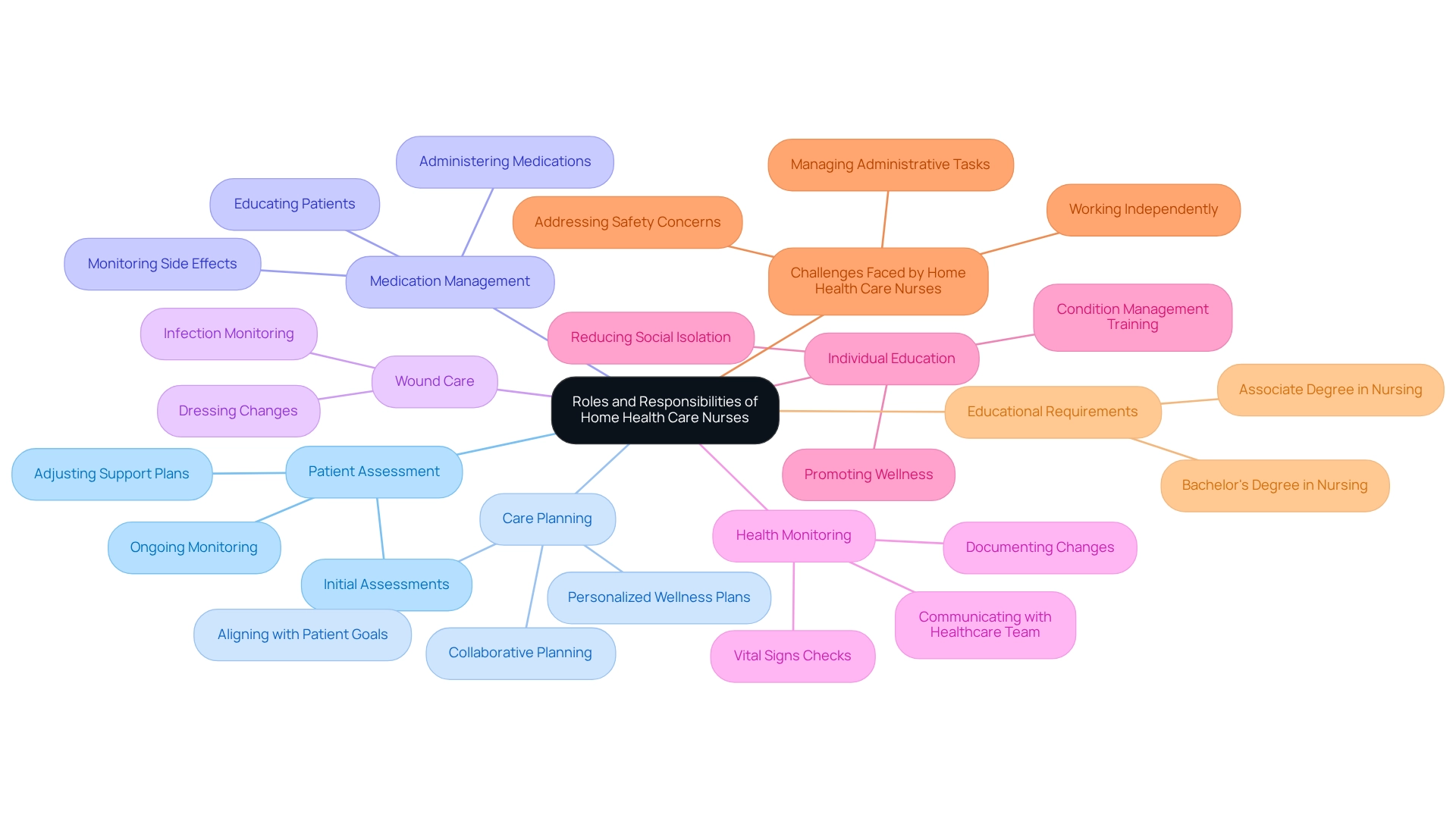
Types of Services Provided in Home Health Care
Home health support encompasses a wide range of services designed with care to meet the unique needs of individuals, particularly the elderly. At Best Care Nurses Registry, we understand the importance of compassionate care and offer:
- Skilled Nursing Support: Provided by registered nurses, this essential service includes medical assistance such as assessments, medication administration, and wound management. We ensure that individuals receive the highest standard of medical attention in the comfort of their homes.
- Physical Therapy: Our tailored exercise programs are crafted to help individuals regain mobility and strength, facilitating a smoother recovery process and enhancing overall physical function.
- Occupational Therapy: This service is dedicated to assisting individuals in performing daily activities, thereby improving their quality of life and promoting independence in their routines.
- Speech Therapy: Designed to support individuals facing communication and swallowing difficulties, this therapy plays a crucial role in enhancing their ability to interact and consume food safely.
- Home Health Aide Services: Our Certified Nursing Assistants (CNAs) and Home Health Aides (HHAs) provide vital assistance with daily living activities, including bathing, dressing, and meal preparation. Their daily interaction allows them to keep family members informed about important updates regarding the individual’s condition.
- Companionship Services: By offering social engagement and emotional support, these services help alleviate the loneliness and isolation that many elderly individuals face.
Together, these services create comprehensive support plans that address both medical and personal needs, ensuring a holistic approach to individual care. The home health support sector is experiencing significant growth, with approximately 3.0 million individuals receiving assistance from in-home service providers in 2020 alone. This trend reflects a broader shift towards home- and community-based settings, driven by policy changes and the preferences of older adults. Recent case studies indicate that this transition is expected to generate numerous job openings for personal support aides, in line with the increasing demand for in-home assistance services. Additionally, advancements in technology are anticipated to bring greater innovation to the residential support field, enhancing service delivery and individual outcomes.
This evolution underscores the importance of adapting support services to meet the changing needs of patients and their families. At Best Care Nurses Registry, we are committed to personalized service plans tailored to each client’s unique requirements.
We are dedicated to providing affordable and convenient solutions for nursing in home health care. Call (888) 203-2529 to discuss your needs and discover how we can assist you or your loved ones. Our clients often share their positive experiences, highlighting the peace of mind and quality of assistance they receive. This feedback strengthens our commitment to excellence in domestic support, as your comfort is our priority.
Qualifications and Training of Home Health Care Nurses
Professionals involved in nursing in home health care play a crucial role in providing top-notch assistance. They must fulfill specific educational and licensing criteria to ensure they are adequately prepared for their positions. The journey to becoming a residential nursing professional generally includes several essential steps:
- Obtain a Nursing Degree: Aspiring nurses can pursue either an Associate Degree in Nursing (ADN) or a Bachelor of Science in Nursing (BSN). Each program offers fundamental knowledge and skills essential for nursing practice.
- Pass the NCLEX Exam: After completing their degree, candidates must pass the National Council Licensure Examination (NCLEX) to acquire their nursing license, which is a vital step in their professional journey.
- Gain Experience: Many nurses in residential support begin their careers in hospital settings or long-term facilities, where they develop crucial clinical skills and management techniques for individuals.
- Specialized Training: Additional training in areas such as geriatric assistance, wound treatment, and chronic disease management is highly advantageous. This specialized knowledge enables nurses to meet the distinct requirements of elderly individuals and those with intricate medical conditions, ultimately improving their quality of life.
- Continuing Education: Ongoing training is essential for community nursing professionals to remain updated with best practices, new treatments, and advancements in patient support. This commitment to continuous education ensures that they deliver the utmost quality of support.
In Florida, the average salary for nurses in 2025 is anticipated to reflect the increasing demand for these specialists, with a forecasted job shift of 820,500 roles in the personal assistance and aid sector from 2023 to 2033. This trend highlights the significance of specialized training and qualifications in addressing the growing needs of the population.
Educational programs focused on nursing in home health care stress the necessity of formal training and licensure, ensuring that nurses are prepared to deliver high-quality support in residential environments. Insights from nursing educators underscore the vital importance of specialized training in equipping nurses for the challenges they will encounter in residential assistance environments. By following these criteria and training standards, nursing in home health care enables nurses in domestic settings to effectively assist their clients, reduce risks of isolation, and improve their overall quality of life.
Furthermore, the educational structure for residential nurses emphasizes the importance of formal training and licensure, ensuring that nurses are prepared to deliver high-quality nursing in home health care settings.
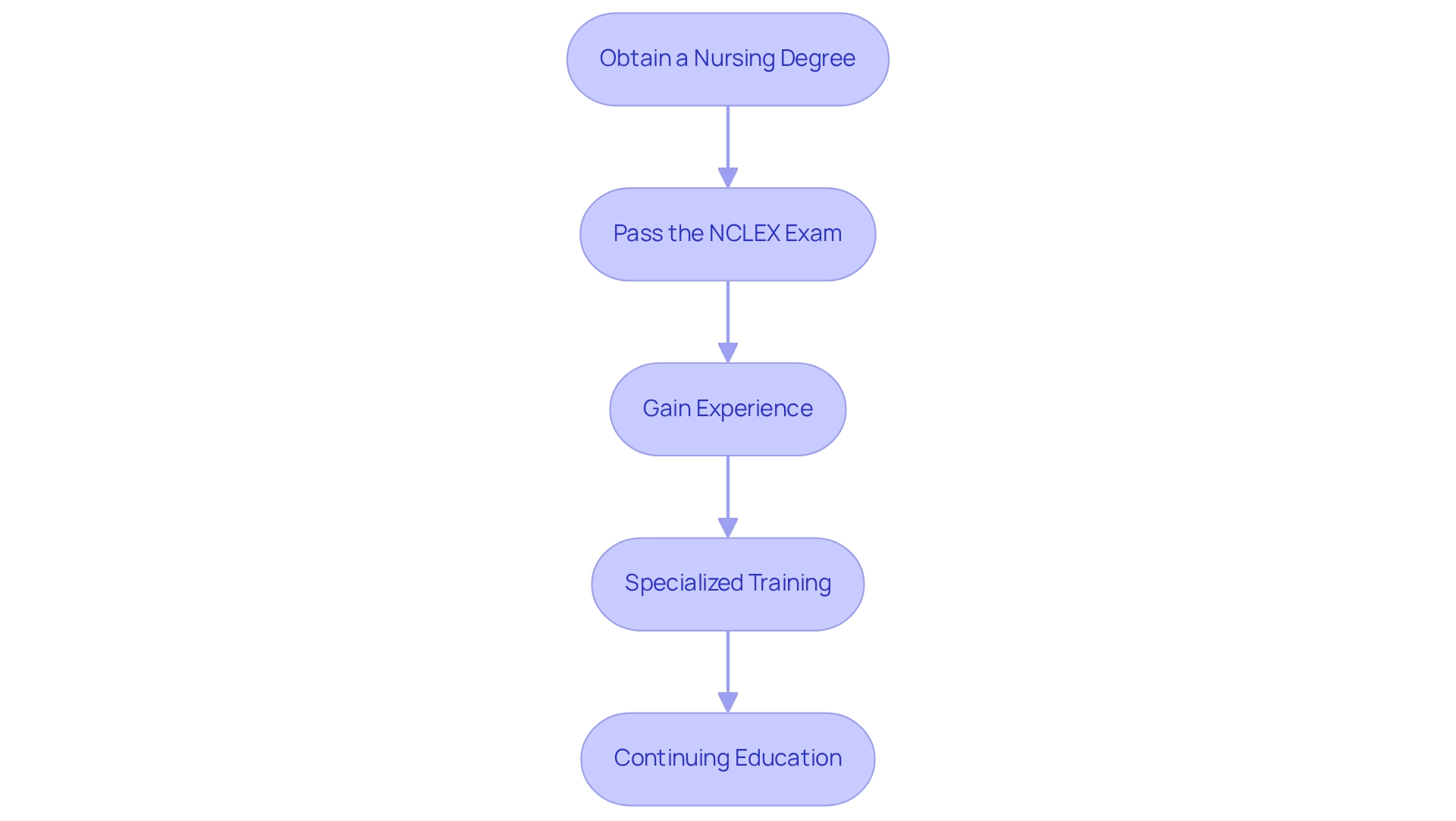
The Importance of Personalized Care in Home Health
Personalized care in home health settings is essential for several compelling reasons:
- Tailored Treatment Plans: Every patient presents unique health needs and preferences, which personalized care plans at Best Care Nurses Registry effectively address. This customization guarantees that support is not only relevant but also aligned with the patient’s lifestyle and values, including considerations for pet-friendly environments.
- Streamlined Process for Health Planning: At Best Care Nurses Registry, we follow a structured approach to ensure personalized support. Step 1 involves a call to speak with our friendly staff to discuss your needs and answer any questions. Step 2 involves talking about your circumstances with you or your loved one and obtaining a treatment plan from your physician that ideally suits your needs. Finally, Step 3 involves referring compassionate caregivers whom you choose to work with.
- Enhanced Patient Engagement: When patients view their treatment as customized specifically for them, they are more likely to actively participate in their therapy and adhere to treatment plans. This involvement is essential for attaining favorable wellness results. As Kirby Browning aptly states, “The quickest way to ruin a customer experience in healthcare is to treat everyone the same.”
- Enhanced Wellness Results: Studies consistently show that individualized support correlates with better wellness results. For instance, a case study analyzing health status through medical claims diagnoses highlighted the effectiveness of personalized strategies in improving health and wellness outcomes. By considering individual lifestyles, preferences, and specific medical conditions, healthcare providers at Best Care can create more effective treatment strategies.
- Enhanced Satisfaction: Both individuals receiving care and their families report significantly higher satisfaction levels when care is personalized. This approach promotes a sense of dignity and respect, which is essential for the emotional well-being of individuals. The compassionate caregivers recommended by Best Care Nurses Registry are committed to ensuring that each individual’s experience is positive and fulfilling.
- Stronger Relationships: Customized support fosters trust between individuals and providers, which is vital for effective communication and service delivery. Robust connections improve the overall experience, making individuals feel appreciated and comprehended. The experienced staff at Best Care, including long-standing members like Sherie, play a crucial role in matching clients with the right caregivers to foster these relationships.
- Technology Integration: Tools such as Rendia’s Outcome Simulator can improve personalized support by visually demonstrating disease conditions and treatment results customized for individual individuals. This technology assists individuals in comprehending their wellbeing more effectively, additionally fostering involvement and contentment.
In summary, nursing in home health care is a cornerstone of effective domestic wellness services at Best Care Nurses Registry, as it provides customized assistance ensuring that patients receive the best possible support tailored to their individual needs. With an average age of 66 among MDVIP members, many individuals in this demographic stand to benefit significantly from such tailored approaches, enhancing their quality of life and independence.
To discuss your needs and schedule a call, please contact us at (888) 203-2529.
Common Challenges in Home Health Care for Families
Families frequently face various difficulties when managing the intricacies of nursing in home health care services, impacting their well-being and the quality of support provided to their loved ones. Key issues include:
- Identifying the Need for Companion and Sitter Services: Determining if a loved one requires companion or sitter services involves observing their daily life for signs of social isolation, difficulty with daily tasks, or safety concerns. These indicators suggest that additional support could enhance their independence and quality of life. Companion services can be tailored to meet specific needs, providing flexible respite care that accommodates varying schedules.
- Communication Barriers: Misunderstandings frequently arise between families and caregivers, leading to frustration and unmet needs. Effective communication is essential to ensure that caregivers fully understand the specific requirements and preferences of the patient. Successful strategies for overcoming communication barriers include establishing clear expectations, utilizing technology for updates, and fostering a collaborative environment between families and caregivers.
- Emotional Stress: The emotional toll of caregiving can be profound, often resulting in caregiver burnout. Studies indicate that family caregivers experiencing extreme stress may age prematurely, with the potential to lose up to ten years of their life due to the pressures of caregiving, as noted by Elissa S. Epel from the University of California, San Francisco. This emotional pressure can result in sensations of isolation and anxiety, especially for those dealing with intricate medical issues. Employing tailored respite support services can assist in reducing some of this pressure.
- Financial Concerns: Maneuvering through insurance coverage and handling the expenses linked with domestic assistance can be daunting. The economic value of family caregiving is estimated at $306 billion annually, highlighting the significant financial implications for families. Comprehending long-term insurance benefits and examining different payment options can lessen some of this burden, ensuring families can obtain the essential support. Nursing in home health care is often more affordable and convenient than treatment in a hospital or nursing facility, providing families with reassurance.
- Finding Qualified Assistance: Identifying a trustworthy in-home service provider that meets particular requirements can be a challenging endeavor. Families must ensure that caregivers are not only qualified but also compatible with the patient to foster trust and comfort. Best Care Nurses Registry offers tailored caregiver matching services to ensure empathetic nursing in home health care support.
- Coordination of Support: Ensuring that all elements of assistance are smoothly organized among different providers can be intricate. This includes managing appointments, medications, and communication between different healthcare professionals. Tackling these difficulties requires transparent communication, comprehensive investigation, and assistance from healthcare experts.
By employing these approaches, families can improve the standard of support and lessen the emotional strain linked to caregiving. Moreover, practical solutions like adjustments to residences and training for elderly individuals can effectively tackle physical constraints, enhancing independence for older clients and potentially decreasing workplace injuries for caregivers associated with lifting and transferring patients.
For further details and to discuss your specific requirements, please contact Best Care Nurses Registry at (888) 203-2529. Our welcoming team is here to assist you in developing a customized support plan that meets your loved one’s needs.
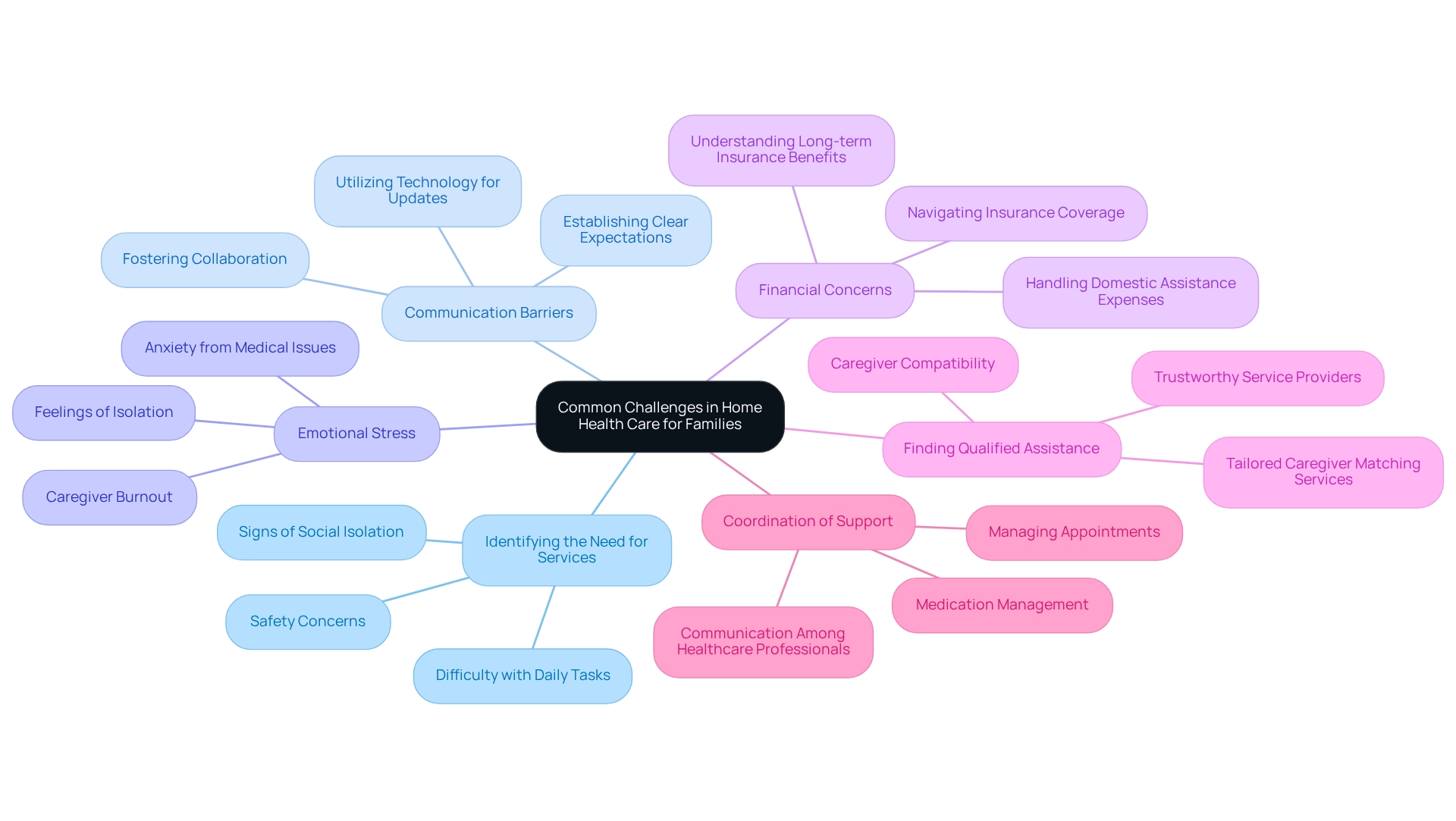
Choosing the Right Home Health Care Provider
Selecting the right home support provider is a crucial decision that can significantly impact the quality of care for your loved ones. Here are several important steps to guide families through this process:
- Assess Your Needs: Begin by identifying the specific services required based on the patient’s medical condition and personal preferences. This might include assistance with daily activities, skilled nursing services, or companionship. Home health care is often more affordable, accessible, and equally effective as treatment received in a hospital or nursing facility, making it a viable option for many families.
- Research Providers: Look for agencies that have strong reputations, positive reviews, and the necessary certifications. With a projected need for 924,000 personal support assistants and domestic support aides between 2021 and 2031, the demand for quality providers is on the rise, making thorough research essential. Additionally, increased government funding for healthcare programs underscores the growing support for these services, making it vital to choose a provider that can effectively navigate these resources. Since 1980, Best Care Nurses Registry has been delivering personalized nursing in home health care in South Florida, ensuring a wealth of experience and expertise.
- Interview Potential Providers: Engage in conversations with potential providers to ask about their services, staff qualifications, and support plans. This dialogue is essential to ensure their offerings align with your specific needs and expectations. At Best Care Nurses Registry, our welcoming team is ready to discuss your circumstances and help develop a support plan tailored to your loved one’s requirements for nursing in home health care.
- Check References: Reach out to other families who have utilized the provider’s services. Their firsthand experiences can offer valuable insights into the quality of service and reliability of the agency. Testimonials from satisfied clients, like those who have praised the compassionate support provided by Best Care Nurses Registry, can further assist in your decision-making process.
- Evaluate Compatibility: It’s crucial to ensure that the caregivers are a good match for the patient’s personality and support needs. A compatible caregiver can enhance the comfort and effectiveness of the assistance provided. It’s also noteworthy that certified caregivers earn an average base pay of $15.65 per hour, which may influence families’ decisions when selecting a provider. At Best Care Nurses Registry, we prioritize pairing clients with empathetic caregivers who meet their specific needs and ensure competitive compensation to attract skilled professionals in nursing in home health care.
By following these steps, families can make informed choices that lead to the best possible care for their loved ones. The importance of personalized support is highlighted by the fact that residential healthcare services assist nearly 4.5 million individuals each year in the U.S., offering benefits such as reduced hospital readmissions—14.1% of residential wellness episodes resulted in hospital admissions from 2019 to 2023—and increased satisfaction among clients. Ultimately, taking the time to choose the right provider can alleviate stress and improve the quality of life for both patients and their families.
For more information or to discuss your specific needs, please reach out to Best Care Nurses Registry at (888) 203-2529.
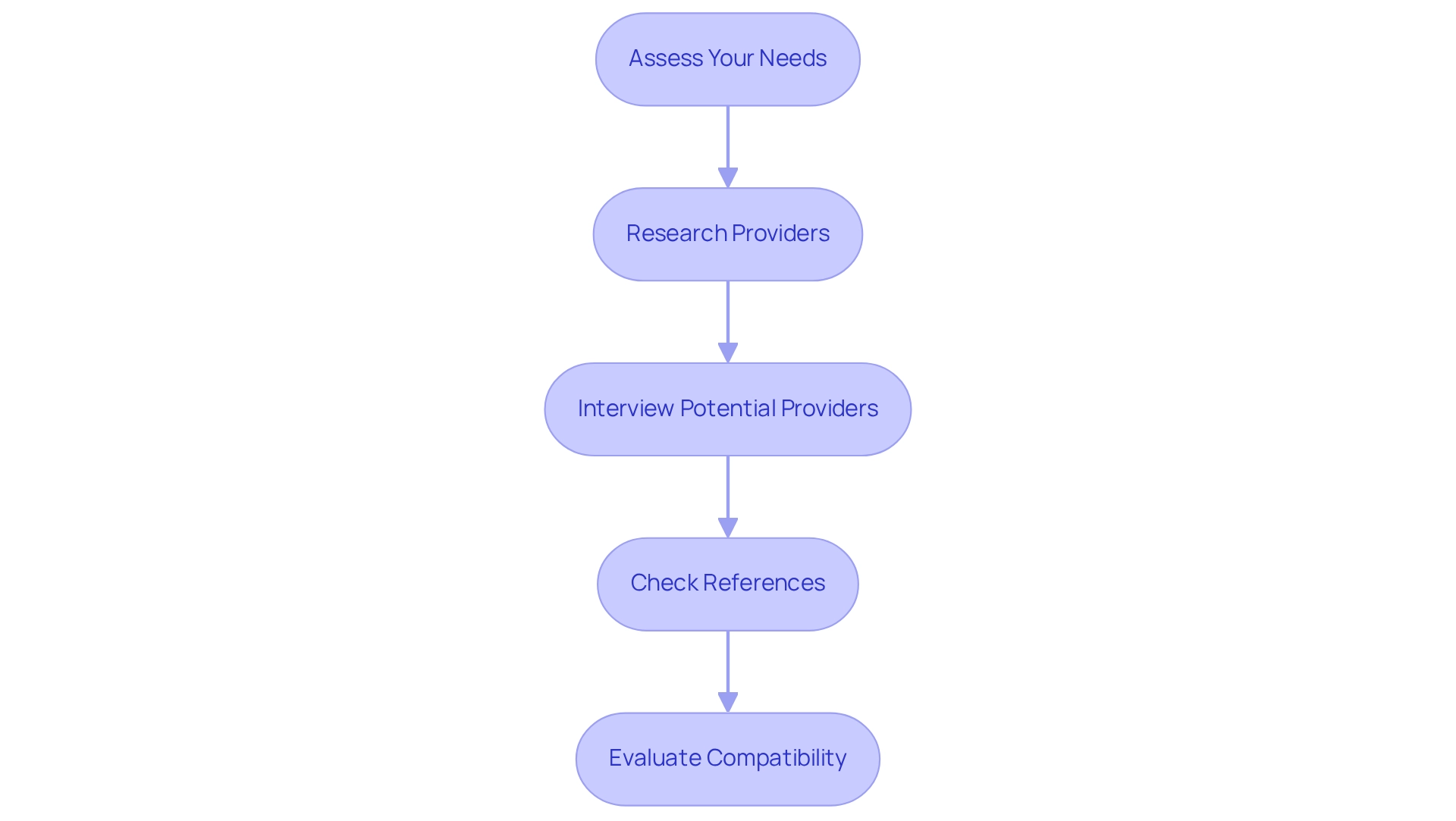
Understanding Costs and Insurance in Home Health Care
Understanding the expenses associated with residential support services is crucial for families navigating this complex landscape. It’s natural to have concerns about how to manage these costs effectively. Here are some key considerations to keep in mind:
- Insurance Coverage: Various insurance plans, including Medicare, offer coverage for specific domestic support services. However, the extent of this coverage can vary significantly among plans. Families should take the time to review their policies carefully to understand which services are included and any limitations that may apply.
- Out-of-Pocket Costs: Anticipating potential out-of-pocket expenses, such as co-pays and deductibles, is essential. In Florida, typical out-of-pocket costs for residential support can differ, making it important to plan accordingly and understand the financial implications of assistance.
- Payment Options: Many residential support providers, including Best Care Nurses Registry, offer flexible payment arrangements to accommodate various financial situations. Families are encouraged to engage in discussions with providers about available payment options, ensuring they find a solution that fits their budget.
- Long-Term Support Insurance: For those with long-term support insurance, exploring how these policies can assist in covering expenses is vital. Families should familiarize themselves with the necessary paperwork and procedures for submitting claims, as this can significantly ease the financial burden associated with support.
Best Care Nurses Registry, with its extensive experience and strong reputation in South Florida, emerges as a trusted choice for families seeking nursing and home health care services. The organization offers unique features such as no lengthy contracts, a concierge service for 24/7 nurse availability, and guaranteed compatible caregiver pairings, which can alleviate financial concerns for families.
Being informed about these financial aspects not only helps reduce stress but also empowers families to make informed decisions regarding the care of their loved ones. With approximately 3.0 million individuals receiving domestic wellness services in 2020, understanding these factors is more important than ever for families seeking quality assistance.
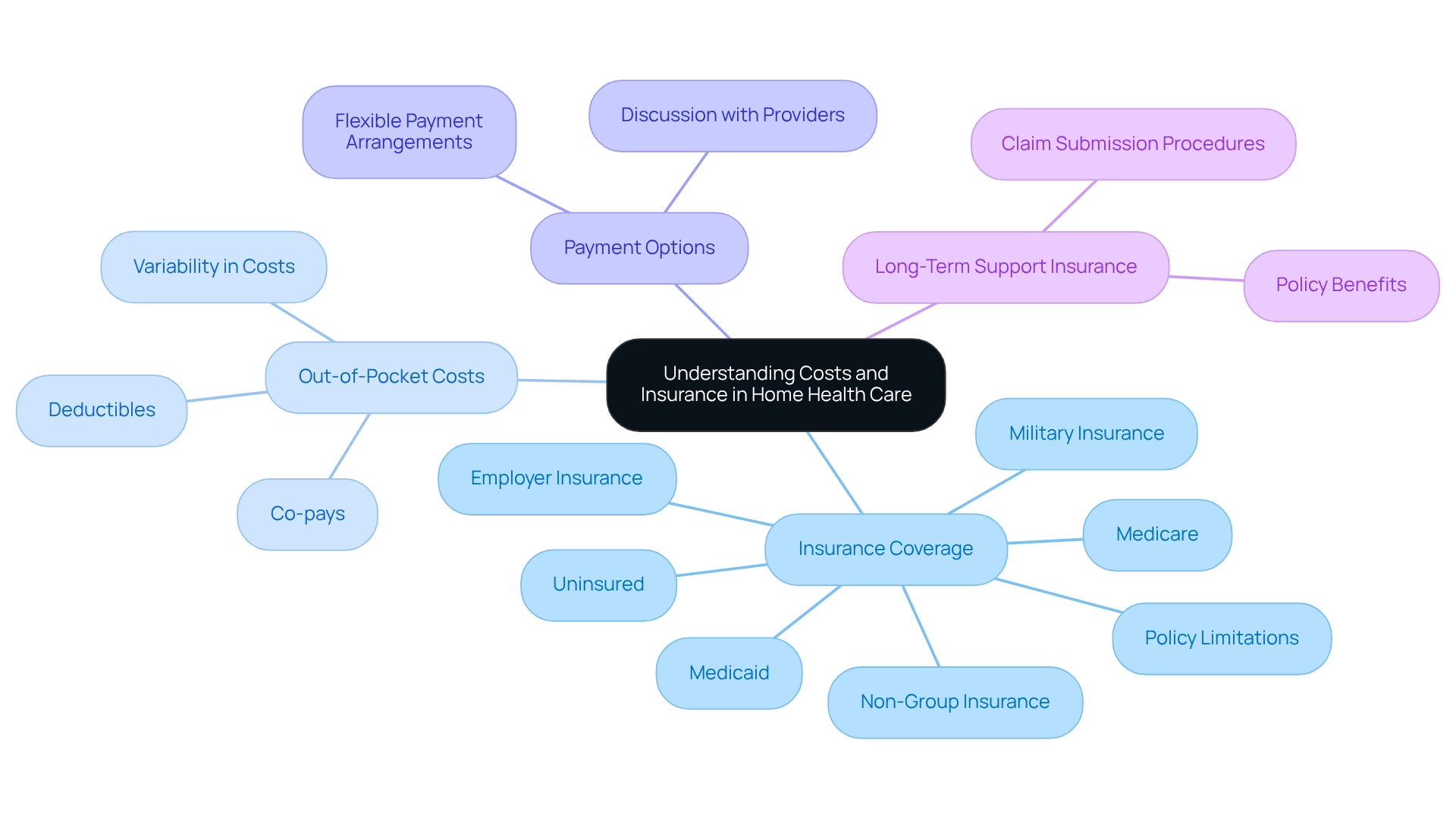
Emotional and Psychological Support in Home Health Care
Emotional and psychological assistance is a crucial component of residential support, greatly influencing the well-being of both patients and caregivers. This support encompasses several key elements:
- Companionship: Caregivers play a vital role in providing companionship, helping to alleviate feelings of loneliness and isolation. Research suggests that social engagement can lead to better mental well-being, lowering the likelihood of depression among older adults. This companionship is especially significant in nursing and home health care, where the comfort of familiar surroundings can enhance emotional well-being.
- Counseling Services: Numerous home care agencies, such as Best Care Nurses Registry, recognize the importance of mental well-being and provide access to licensed experts who offer counseling and emotional assistance. This service is particularly vital in the post-COVID-19 period, where the mental well-being of caregivers and individuals has faced considerable pressure.
- Family Support: Caregivers not only assist individuals but also aid families in navigating the emotional challenges linked to caregiving. They provide resources, guidance, and a listening ear, which can be invaluable in managing stress and anxiety, ensuring that families feel supported throughout their caregiving journey.
- Stress Management: Implementing programs that teach stress management techniques can greatly benefit both individuals and caregivers. These programs may include mindfulness practices, relaxation techniques, and coping strategies that enhance emotional resilience, contributing to a more balanced caregiving experience.
Studies conducted from August 17, 2022, to February 9, 2023, have demonstrated that emotional support services in residential care can lead to a 30% improvement in client satisfaction and a significant reduction in caregiver burnout. Furthermore, successful companionship initiatives have shown a positive effect on individual mental well-being, nurturing a sense of belonging and purpose.
The research titled ‘Barriers and Facilitators to His Mental Well-Being’ emphasizes the distinct obstacles encountered by home care aides (HHAs) and highlights the importance of emotional support in nursing and home health care for both caregivers and patients. Mental wellness experts advocate for integrated treatment models that prioritize emotional well-being alongside physical wellness, emphasizing that addressing psychological needs is essential for comprehensive support.
Participants in the research expressed a desire for programs and assistance to enhance their mood and emotions, including mental wellness courses and peer support initiatives. This feedback strengthens the case for the importance of emotional support services in domestic assistance.
In summary, by prioritizing emotional and psychological support, nursing in home health care services, such as those provided by Best Care Nurses Registry, can significantly enhance the quality of life for individuals and their families, ensuring a more compassionate and effective caregiving experience. Moreover, at-home medical services are not only economical but also practical, enabling individuals to receive assistance in the comfort of their own residences. If you are looking for personalized support for your loved ones, contact Best Care Nurses Registry today at (888) 203-2529 to schedule a consultation and discuss your needs.
As one participant noted, “It is always good to share different opinions with someone who knows your situation. And to work together too,” highlighting the value of companionship and emotional support.
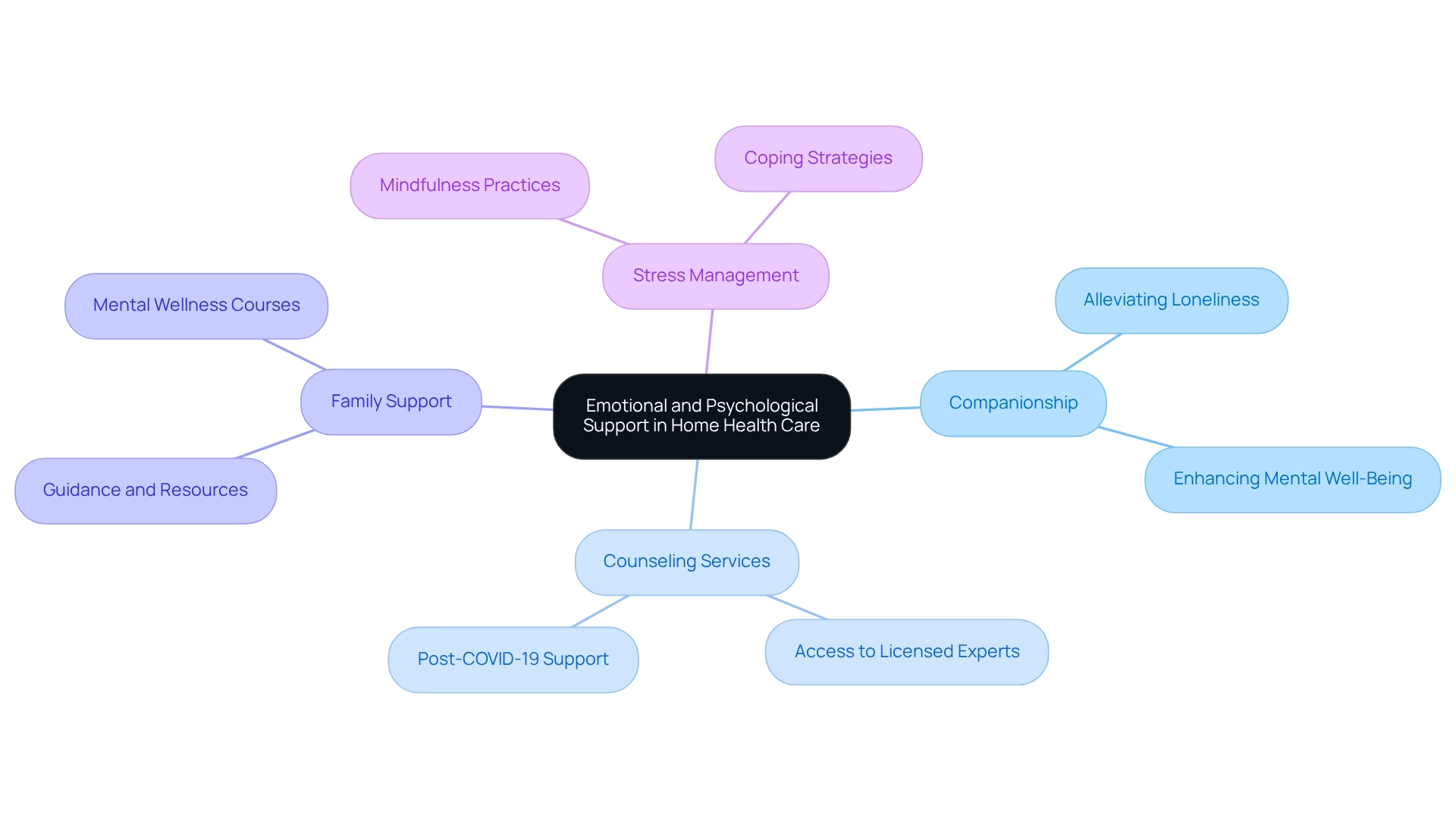
The Future of Home Health Care Nursing
The future of residential nursing is on the brink of significant transformation, influenced by several important trends that aim to enhance care for your loved ones.
- Technological Advancements: Innovations like telehealth, remote monitoring, and mobile wellness applications are revolutionizing how care is delivered. These technologies not only make services more accessible but also improve efficiency, allowing caregivers to provide timely and effective support right at home. For instance, the integration of AI and Intelligent Automation is expected to boost caregiver efficiency and client outcomes, empowering organizations like Best Care Nurses Registry to serve families more effectively.
- Rising Demand: As our population ages, the need for residential support services is anticipated to grow. The Health Services & Resources Administration (HRSA) projects a national shortage of 207,980 registered nurses (RNs) and 302,440 licensed practical nurses (LPNs), underscoring the urgent need for skilled professionals in this vital sector. This rising demand will create numerous job opportunities, positioning home wellness as a crucial area for future employment.
- Focus on Customized Support: At Best Care Nurses Registry, we understand that personalized care is paramount. Creating support plans tailored to the unique needs of each individual not only enhances client satisfaction but also leads to better wellness outcomes. By collaborating with our compassionate providers, families can ensure their loved ones receive the attention and assistance they truly deserve.
- Integration of Services: Home health support is increasingly being integrated with other healthcare services, fostering a more coordinated approach to individual care. This integration ensures that patients receive comprehensive support, connecting various healthcare providers and enhancing the overall quality of service. We encourage healthcare institutions and medical associations to adopt a value-driven Home-Based approach to improve service delivery.
Staying informed about these trends is essential for families navigating the complexities of care for their loved ones. By understanding the evolving landscape of nursing in home health care, families can make informed decisions that prioritize their loved ones’ well-being and comfort. Additionally, it’s worth noting that certified caregivers earn an average base pay of $15.65 per hour, reflecting the dynamics of this essential workforce. Remember, we’re here for you, and your comfort is our priority.
Conclusion
The significance of home health care nursing is increasingly recognized as a vital component of modern healthcare. This specialized field not only provides essential medical care but also enhances the quality of life for patients by offering personalized support in the comfort of their own homes. Home health care nurses, through their diverse roles—from medication management to emotional support—play an indispensable part in ensuring that individuals, especially seniors and those with chronic conditions, receive tailored care that meets their unique needs.
As the demand for home-based services continues to grow, driven by an aging population and a preference for personalized care, families are encouraged to explore the various options available. Understanding the qualifications, responsibilities, and services provided by home health care professionals is crucial in navigating this landscape. This knowledge empowers families to make informed decisions, ensuring that their loved ones receive not only the necessary medical attention but also the emotional and psychological support essential for overall well-being.
In conclusion, the future of home health care nursing is bright, marked by technological advancements and a focus on integrated, personalized care. By embracing these changes, families can enhance the caregiving experience, fostering stronger relationships between patients and caregivers while improving health outcomes. As home health care continues to evolve, the commitment to compassionate, individualized care remains at the forefront, ensuring that every patient receives the attention and support they truly deserve.
Frequently Asked Questions
What is nursing in home health care?
Nursing in home health care involves providing medical assistance directly to patients in their own homes, allowing individuals, particularly seniors and those with chronic illnesses, to receive continuous care in a familiar and comfortable environment.
What are the key responsibilities of nurses in home health care?
Nurses in home health care perform several essential duties, including patient assessment, care planning, medication management, wound care, health monitoring, and individual education to support patients’ medical and emotional needs.
Why is home health care nursing important?
Home health care nursing enhances individual comfort, promotes independence, improves quality of life, and helps manage medical conditions effectively, reducing the likelihood of avoidable hospital admissions.
How has the trend in home health care changed recently?
There is a growing preference among patients for receiving treatment at home rather than in medical facilities, driven by policy changes and the desire for individualized care, leading to an increase in job opportunities for personal support aides.
What services does Best Care Nurses Registry provide?
Best Care Nurses Registry offers a range of services including skilled nursing support, physical therapy, occupational therapy, speech therapy, home health aide services, and companionship services to meet the diverse needs of individuals.
What qualifications do home nursing professionals need?
Home nursing professionals typically need either an associate degree in nursing or a bachelor’s degree in nursing, along with specialized training to handle the unique challenges of home health care.
How does home health care support emotional well-being?
Home health care not only addresses medical needs but also provides emotional and psychological support, helping to alleviate feelings of loneliness and isolation, particularly among elderly individuals.
What is the expected growth in the home health care sector?
The home health care sector is experiencing significant growth, with millions of individuals receiving assistance, and this trend is expected to continue due to increasing demand for in-home services and advancements in technology.











